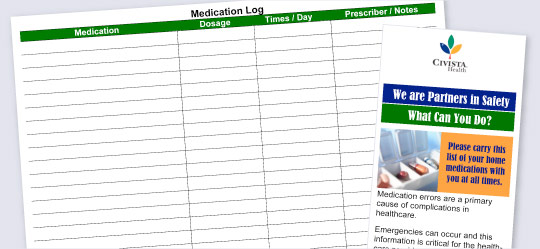Personal Pocket Prescription Card

HAVE YOUR MEDICATION INFORMATION RIGHT AT YOUR FINGERTIPS. KNOW YOUR MEDICATIONS FOR BETTER HEALTH!
Now more than ever, patients are taking a more active role in their healthcare. Chronic diseases are on the rise as our population ages, making ongoing self-care—particularly the use of prescription and over-the-counter drugs—more critical. Are you taking your medication properly? Below are 11 helpful suggestions about using medications wisely.
1. Learn about your medications. Whenever you get a new medication, make sure you know the following:
- What is the name of the drug and what is it supposed to do?
- How and when do I take it—and for how long?
- What foods, drinks, other medicines or activities should I avoid while taking this drug?
- Are there any side effects, and what do I do if they occur?
- Is there any written information available about the drug?
2. Maintain a current pocket medication card.
Your card should include the medication’s name, strength, dose, frequency and reason for taking the drug. The card should include prescription medications, vitamins, supplements, over-the-counter products and natural or alternative medicine remedies. Also record any allergies you have on your prescription card.
3. Read the label each time you take the medicine.
Doing so will ensure you are taking the right drug the right way.
4. Never take anyone else’s prescription medication.
Also, never give your medication to others.
5. Treat medications just like dangerous chemicals.
Medications should be kept out of reach of children and pets.
6. Get rid of medications you are no longer using.
Dispose of all unused medication properly.
7. Don’t chew, break or crush capsules or tablets unless instructed by your physician.
Some long-acting medications are designed to be taken in a specific way and can be dangerous if taken incorrectly.
8. Use only the cup or other measuring device supplied with the drug when administering liquid medications.
Other measuring devices—such as household teaspoons and tablespoons—may not give accurate measurements.
9. Choose a pharmacy wisely.
Your pharmacy should be able to maintain a computerized list of all your medications, allergies and chronic medical conditions.
10. Inform your physician and pharmacist of any herbal or natural remedies you take.
Herbal remedies may interact or even duplicate your medications as well as cause allergic reactions.
11. Call your physician’s office with questions.
If you have questions or concerns about your medication or if your symptoms worsen, talk to your doctor.


